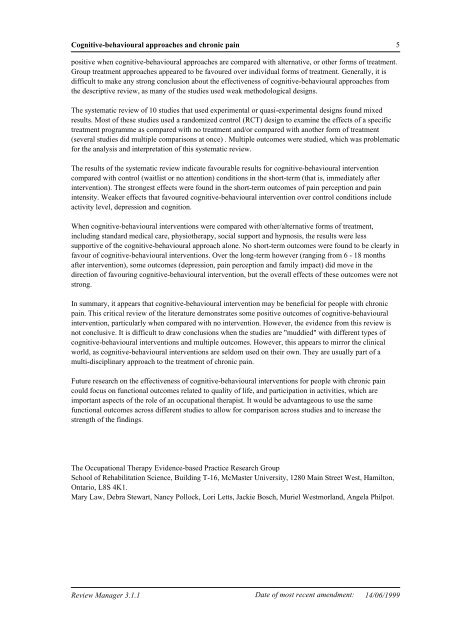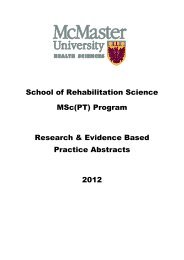The effectiveness of cognitive-behavioural interventions with people ...
The effectiveness of cognitive-behavioural interventions with people ...
The effectiveness of cognitive-behavioural interventions with people ...
You also want an ePaper? Increase the reach of your titles
YUMPU automatically turns print PDFs into web optimized ePapers that Google loves.
Cognitive-<strong>behavioural</strong> approaches and chronic pain 5positive when <strong>cognitive</strong>-<strong>behavioural</strong> approaches are compared <strong>with</strong> alternative, or other forms <strong>of</strong> treatment.Group treatment approaches appeared to be favoured over individual forms <strong>of</strong> treatment. Generally, it isdifficult to make any strong conclusion about the <strong>effectiveness</strong> <strong>of</strong> <strong>cognitive</strong>-<strong>behavioural</strong> approaches fromthe descriptive review, as many <strong>of</strong> the studies used weak methodological designs.<strong>The</strong> systematic review <strong>of</strong> 10 studies that used experimental or quasi-experimental designs found mixedresults. Most <strong>of</strong> these studies used a randomized control (RCT) design to examine the effects <strong>of</strong> a specifictreatment programme as compared <strong>with</strong> no treatment and/or compared <strong>with</strong> another form <strong>of</strong> treatment(several studies did multiple comparisons at once) . Multiple outcomes were studied, which was problematicfor the analysis and interpretation <strong>of</strong> this systematic review.<strong>The</strong> results <strong>of</strong> the systematic review indicate favourable results for <strong>cognitive</strong>-<strong>behavioural</strong> interventioncompared <strong>with</strong> control (waitlist or no attention) conditions in the short-term (that is, immediately afterintervention). <strong>The</strong> strongest effects were found in the short-term outcomes <strong>of</strong> pain perception and painintensity. Weaker effects that favoured <strong>cognitive</strong>-<strong>behavioural</strong> intervention over control conditions includeactivity level, depression and cognition.When <strong>cognitive</strong>-<strong>behavioural</strong> <strong>interventions</strong> were compared <strong>with</strong> other/alternative forms <strong>of</strong> treatment,including standard medical care, physiotherapy, social support and hypnosis, the results were lesssupportive <strong>of</strong> the <strong>cognitive</strong>-<strong>behavioural</strong> approach alone. No short-term outcomes were found to be clearly infavour <strong>of</strong> <strong>cognitive</strong>-<strong>behavioural</strong> <strong>interventions</strong>. Over the long-term however (ranging from 6 - 18 monthsafter intervention), some outcomes (depression, pain perception and family impact) did move in thedirection <strong>of</strong> favouring <strong>cognitive</strong>-<strong>behavioural</strong> intervention, but the overall effects <strong>of</strong> these outcomes were notstrong.In summary, it appears that <strong>cognitive</strong>-<strong>behavioural</strong> intervention may be beneficial for <strong>people</strong> <strong>with</strong> chronicpain. This critical review <strong>of</strong> the literature demonstrates some positive outcomes <strong>of</strong> <strong>cognitive</strong>-<strong>behavioural</strong>intervention, particularly when compared <strong>with</strong> no intervention. However, the evidence from this review isnot conclusive. It is difficult to draw conclusions when the studies are "muddied" <strong>with</strong> different types <strong>of</strong><strong>cognitive</strong>-<strong>behavioural</strong> <strong>interventions</strong> and multiple outcomes. However, this appears to mirror the clinicalworld, as <strong>cognitive</strong>-<strong>behavioural</strong> <strong>interventions</strong> are seldom used on their own. <strong>The</strong>y are usually part <strong>of</strong> amulti-disciplinary approach to the treatment <strong>of</strong> chronic pain.Future research on the <strong>effectiveness</strong> <strong>of</strong> <strong>cognitive</strong>-<strong>behavioural</strong> <strong>interventions</strong> for <strong>people</strong> <strong>with</strong> chronic paincould focus on functional outcomes related to quality <strong>of</strong> life, and participation in activities, which areimportant aspects <strong>of</strong> the role <strong>of</strong> an occupational therapist. It would be advantageous to use the samefunctional outcomes across different studies to allow for comparison across studies and to increase thestrength <strong>of</strong> the findings.<strong>The</strong> Occupational <strong>The</strong>rapy Evidence-based Practice Research GroupSchool <strong>of</strong> Rehabilitation Science, Building T-16, McMaster University, 1280 Main Street West, Hamilton,Ontario, L8S 4K1.Mary Law, Debra Stewart, Nancy Pollock, Lori Letts, Jackie Bosch, Muriel Westmorland, Angela Philpot.Review Manager 3.1.1 Date <strong>of</strong> most recent amendment: 14/06/1999
















